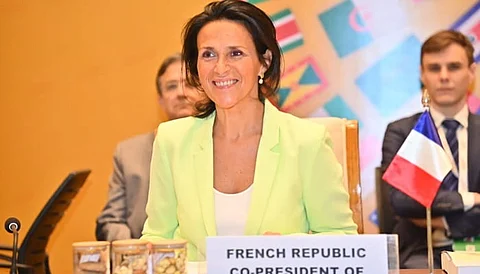

New Delhi: France's top priority at the annual UN climate talks in Dubai will be to support all commitments, particularly financial ones, to accelerate the global energy transition, a minister representing the country said on Tuesday.
Addressing the sixth assembly of the International Solar Alliance (ISA) here, Chrysoula Zacharopoulou, the French Minister of State for Development, said climate catastrophes are multiplying and it is vital that countries "step up efforts on all fronts" to meet the objectives of the 2030 Agenda for Sustainable Development and the Paris Agreement. "At the COP, one of France's priorities will be to support all commitments - particularly financial - to accelerate the global energy transition," she said.
India and France jointly launched the ISA at the 2015 UN climate conference in Paris. The intergovernmental organisation works to address energy needs and challenges of its member countries and scale up solar through multiple flagship interventions.
Zacharopoulou said the solar revolution is underway and is set to accelerate drastically over the coming years. "The new figures from the International Energy Agency (IEA) are striking. Year after year, the solar power boom beats the most optimistic forecasts. At the time we founded our Alliance, the IEA predicted just 1,400 gigawatts of solar power by 2050, but we surpassed that mark as early as 2023," she said. The IEA has predicted over 12,000 gigawatts of solar energy by 2050.
"So, the challenge for our organisation is no longer to support the growth of solar energy. This boom is inevitable, and it's already underway. Today, our mission is to steer this momentum," the French minister said.
She said one of the major challenges is to accelerate the deployment of solar energy in major markets such as Europe and India, in order to structure a truly global ecosystem.
"Europe and France remain deeply committed to implementing this solar transition on our territory. By 2030, we intend to increase the share of renewable energy in the EU's energy consumption to over 42 percent. In France, our ecological plan calls for doubling the rate of solar capacity installation. And I know that in India, this revolution is also underway," she said.
The minister highlighted another major challenge: ensuring that investment in solar energy is equitably distributed and also benefits developing countries, from Africa to the Middle East and South-East Asia.
"Unfortunately, the solar revolution I've described is not benefiting everyone. It's not bearing fruit everywhere at the same speed. The African continent possesses 60 percent of the world's solar potential, but only 1 percent of installed solar capacity. It is this great injustice that our Alliance must tackle," she said. She said France wants to work together with other nations to improve access to financing.
"Billions of euros from France and other donors won't solve the problem. We need to reform the international financial architecture so that it meets the challenges of the 21st century, and in particular, the energy transition challenge. In particular, we need to ensure that private investment in renewable energies is leveraged to flow to developing countries," Zacharopoulou said.
She underscored the solar revolution isn't just about billions in investment and silicon panels. The solar revolution also includes engineers, technicians, training centres and the creation of genuine scientific, technological and entrepreneurial ecosystems.
The UN climate talks this year will take place at Expo City Dubai from November 30 to December 12. The conference is expected to convene over 70,000 participants, including heads of state, government officials and international industry leaders.
